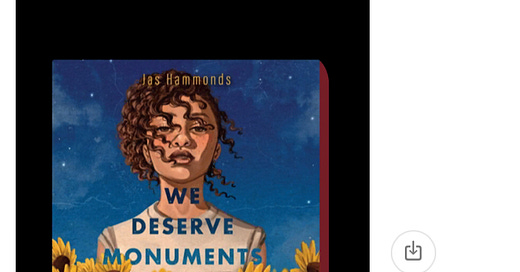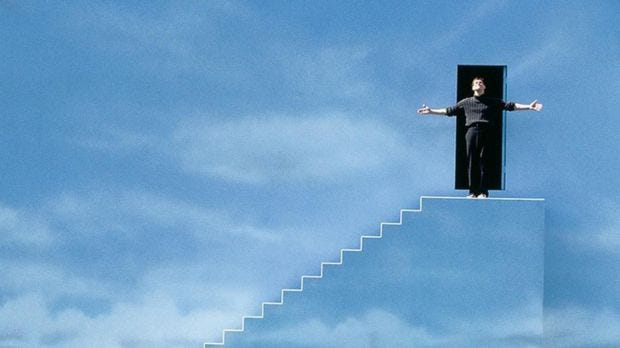IS THIS BOOK ADEQUATELY HYPED?
I'm all over the place here (stomach flu recovery + children), apologies! I tried! I'm trying to talk about ... talking about your book ... in a captivating way.
Ah, yes. How to answer this question:
This is a text from my best friend who is a seventh grade English teacher and the person I foremost trust with YA and MG recommendations. To me, an industry insider (xoxo, gossip girl) this book was everywhere, and rightly so:
We Deserve Monuments was: Winner of the 2023 Coretta Scott King - John Steptoe Award for New Talent, an Indie Bestseller, #1 Kids’ Indie Next Pick, an Indies Introduce Pick, Named a Best Book of the Year by Amazon, Barnes & Noble, Kirkus Reviews, School Library Journal, and Bookpage, and got six starred reviews. Hammonds was also on All Things Considered, she got a coveted children’s spot in an interview with Roger in Horn Magazine, and was in Shondaland (which has since discontinued its book coverage for more of an emphasis on Shondarverse).
So, not only critically-acclaimed, but bookseller-beloved, and good publicity—it has a winning forumla. While this isn’t true only for children’s books, I do find that the divide in “media coverage” and sales is especially vast in children’s literature. There are not that many outlets (or nearly as many) that cover children’s authors and books as there are for adults. Bloggers actually have a lot of pull in children’s books for this reason. And if there were, we would mostly still be relying on adults to find those books for children.
Having a conduit to finding books IS the whole point of publicity, and having a conduit to a book that’s another person you trust is much more successful than finding a book through media. However, the outlets to reach the core audience here (children) are nonexistent. Where is Highlights Magazine when you need them? Teen Vogue does excellent work, but not much in books. I love Samantha Balaban’s Picture This at NPR. Maybe Dolly should start putting a Dolly’s picks book guide in her monthly book picks at Imagination Library (Dolly, call me!) or National Geographic could do one in their Nat Geo Kids Magazine. Or simply imagine if Ms. Rachel put out a seasonal book list like Obama.
That all being said, my best friend was reading We Deserve Monuments almost two years after it debuted, which told me it didn’t infiltrate her networks of middle schoolers (and their parents), librarians, fellow educators, and regular NCTE-goers. I know the book sold well because it was immediately followed-up with a deal for a sophomore novel, Thirsty, and which (from my vantage point) got less coverage than We Deserve Monuments. So, I can say that the hype sold the next book because I have no sales numbers (but I assume they’re good!)
There is sometimes a difference between good publicity and good readership. I really love this piece from Rob Hart on his “splashy book deal” and then being dropped from his publisher.
You’ve heard me say it before that my publicity goal isn’t actually coverage—just because you’re anticipated on every list, doesn’t mean you’ll have stellar sales too. My goal for publicity is building-onwards (building a career, building a platform, building towards something larger for the author, community-building, building a bigger portfolio of work, something something something) and I think that takes the work of a full team (including a publicist), and can’t be done by coverage alone. To do that, I find myself having to build a small world for the book, a book’s very own Truman Show. A wide, wide, worldly net of publicity.
Before we get into more tangents, what I’ll say with my whole chest is that publicity cannot determine the merit of your book—that happens internally. No external goal will tell you, “I’ve done it! I’ve written the best book ever,” other than yourself. Like writing goals, publicity goals often move. Once something big happens, the next dopamine hit needs to be bigger. And you can’t judge your book by that feening in a market that actually isn’t looking for the “best art” or the “most entertainment,” but an amalgamation of buzzy fuzzies that have nothing to do with merit.
*
Of course hype matters, but it’s conversation > looking. Talking about a book is far more important than seeing a book, and the way we talk matters. This is where authors have a stake in their publicity process.
Authors need to understand how to talk about their book beyond platitudes and theories. The job in marketing a book is to take the story beyond checkboxes and themes. It’s good to know those of course, but what can you say about all that stuff that’s unique or interesting or compelling or tension-driven? We’ve all read interviews that say nothing. We’ve all read reviews that overgeneralize, summarize the book in a five paragraph essay, and/or are simply “I liked it” with a lot more words.
This review of Creation Lake was all of my feeds this week. Brandon Taylor has the it-factor, so he is read regardless of what he’s writing about, but I think this review might actually spike Zola sales? And he says so many interesting things about so many interesting things, it would be hard for me to narrow that down here. He builds a world for that book (regardless if he demolishes it). That’s the work you want to do for a book.
Publicists don’t always do the work of media training (which is more how to talk than it is what to say), but one thing an author has to do when they’re in publicity mode is come up with talking points, so they can be interesting (characters) to talk with and about. If there’s no pull quote, there’s no pull quote. If there’s no quote tweet, there’s no quote tweet. I’m not saying create drama, though my therapist is always telling me that the negative is heavier than the positive so we pay more attention to it unfortunately, but I am saying you have to do the work of being captivating, no matter the platform—literary mag interview to Entertainment Tonight.
You might be overwhelmed with interviews during publicity, but it is your job as a writer to make each one less-boring than the one before. Talking in Hallmark-greeting-cards about your work will give that work no legs.
MENTION IT ALL as Bethenny Frankel would say (she is, whether we like it or not, the queen of staying relevant—my girl is reviewing expensive chicken salads on her Tiktok, I’m sat). I can’t tell you how unbelievable interested I am in which chicken salads she likes. Why am I like this? Why are any of us like this?
Name-drop! Embrace what’s strange about you! Bring in more stuff (movies, music, books, fashion, hobbies)! Think about the girl who was trying to promote her music on Tiktok and started showing everyone her homemade puppets—launching her music career.
Talk about your other interests and their relation to the book. Read any interview with Hanif Abdurraqib and see how much he brings into the world of his interviews. Name one time he doesn’t mention something fascinating about Ohio. Ohio! He’s beloved because he’s interesting, and he makes us feel interesting when we read him. There’s a magic there.
What I’m saying is refuse to stay general. Refuse the easy craft talk. Refuse the answer you think you “should say.” Make each answer a moment instead. In the snow globe of conversations, yours should have all the little figurines you can think to bring in, and then shake, shake, shake, the wonder of SNOW!
*
I’ll give two examples on how we attempted to bring the world in this week (the world into an email, what am I even saying?).
I wish I could find the tweet from last week that had thousands of likes about how when you’re in the middle of writing something it feels like the whole universe is speaking to you sensually about that piece of writing. You’ll start noticing relevant things everywhere. The trees are speaking. The bus ads are worth quoting in the essay. You read an interview and it says exactly what you needed to get writing on the next part. THAT IS BOOK PUBLICITY. Finding and using those universe tinglings.
Last week (when everyone was ooo) we weren’t getting a lot of responses, so Zoe had the brilliant idea to send the below meme as our follow-up on a book. In a sort of “if this resonates … we promise you’ll like this book.”
And I followed-up with a clip from KeKe Palmer and Amy Poehler talking about “inside work” or work we do on ourselves to be better, mostly so I could use the subject line, “Keke Palmer & Amy Poehler call it the "inside job," [author] wants to help you harness it.”
We both got many more responses from that follow-up. I got more responses because I brought in celebrity culture and Zoe got more responses because the meme is fun, and it took three seconds to read both our emails. Plus, both add just enough interest to lead to wondering about the book.
If we hadn’t been living (scrolling…), we wouldn’t have either of these follow-ups. You need to bring your world into book publicity, hype is created by network, by community, by mycelium. Touch everything like you’re the grass.
As always, the Pine State calendar of events lives here, and you can buy our books here! You can also see what we’re working on and contact us through our website, Pinestatepublicity.com.
ICYMI: Sarah LaBrie’s No One Gets to Fall Apart named as a Best Memoir of 2024 by Nicole Chung in Esquire, and is on Zibby’s Most Anticipated List alongside Abigail Thomas’ Still Life at Eighty, Kelly McMasters & Hyeseung Song were on C-SPAN Book TV, Jesse Lee Kercheval writes about the mind & body of drawing & writing for Writer’s Digest, Iris Jamahl Dunkle’s Riding Like the Wind: The Life of Sanora Babb is an LA Times must read for fall, Didi Jackson’s My Infinity is on the Write or Die September list, Esinam Bediako and Toro Bassey are “sisters in arms” at World Literature Today, Christian Collier is the poem of the week at The Atlantic, and so much more on our Twitter & Instagram.










I love your writing and your newsletter. You are always thinking, and when you write, it makes me smile
Well done.
I know I’m missing the point of this post, I’m sorry, but I just had to pop in and say that that meme is hilarious I’m screaming lollll